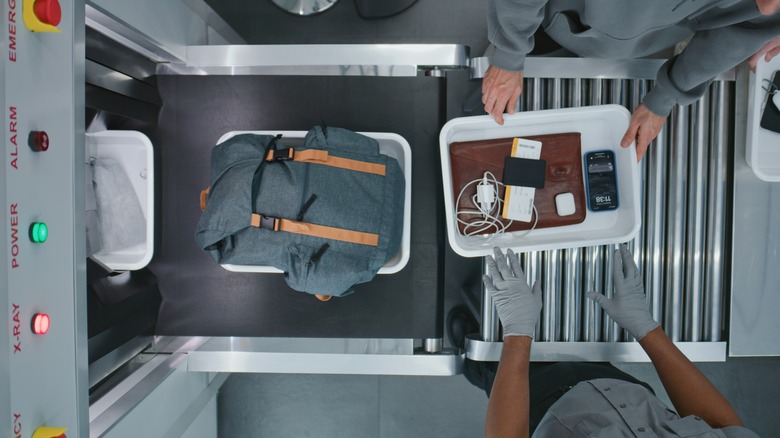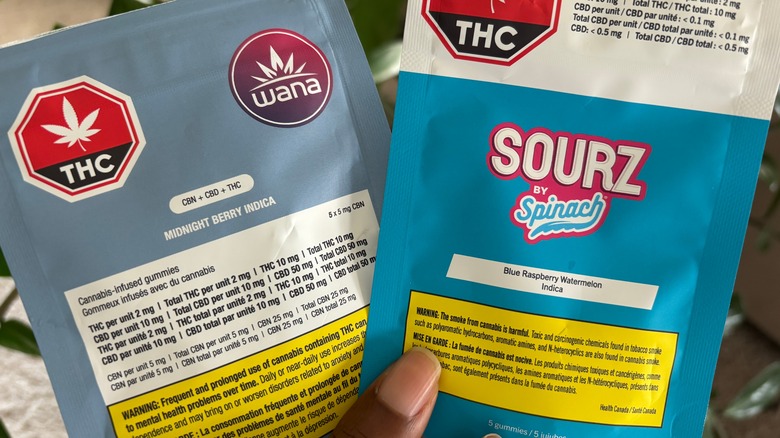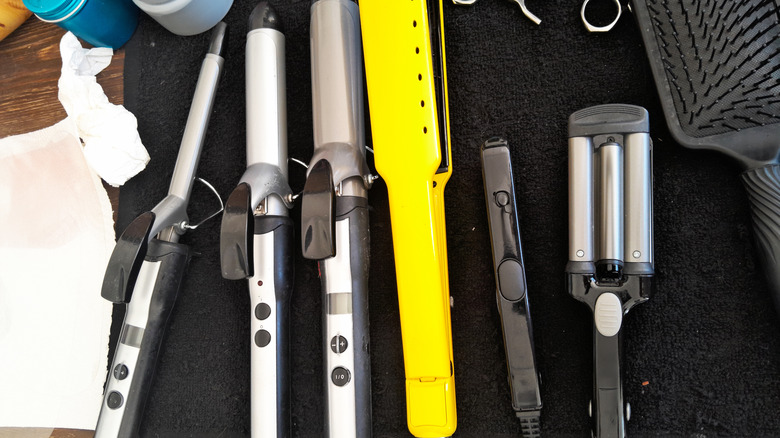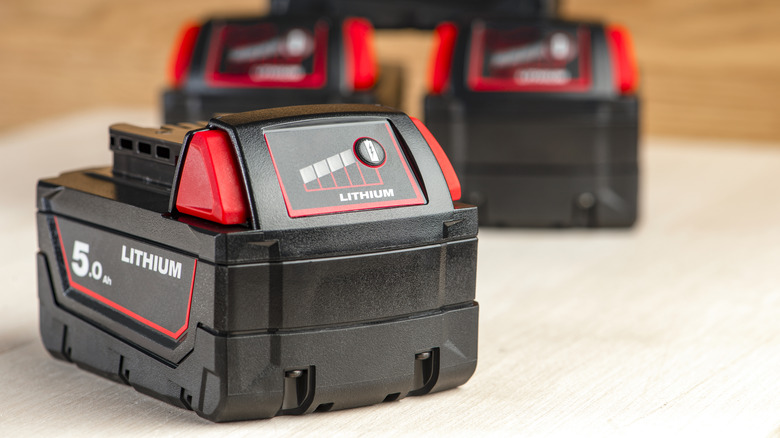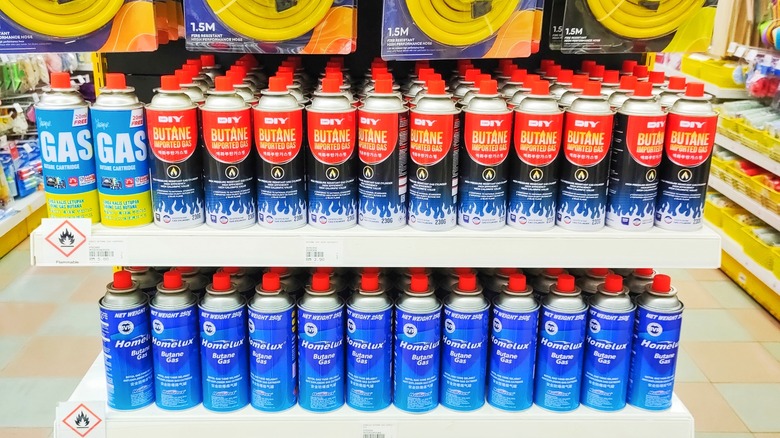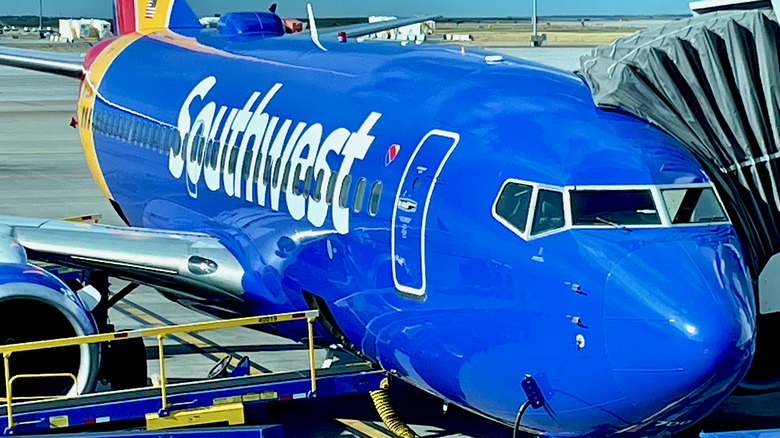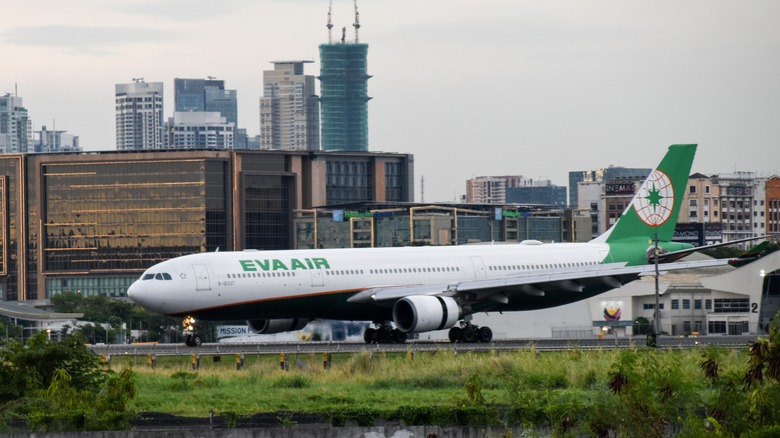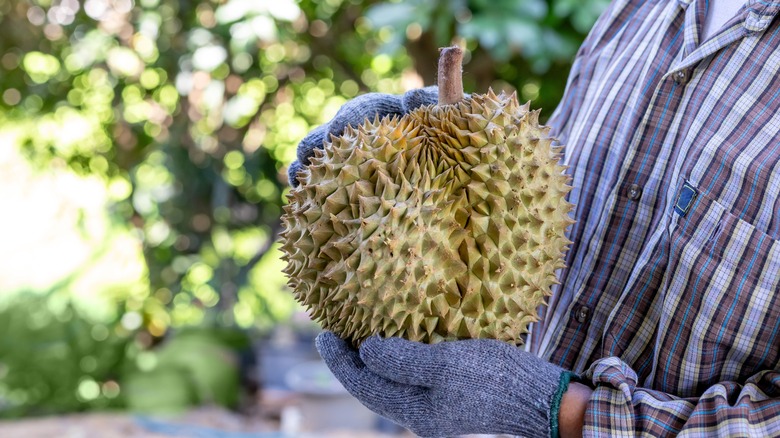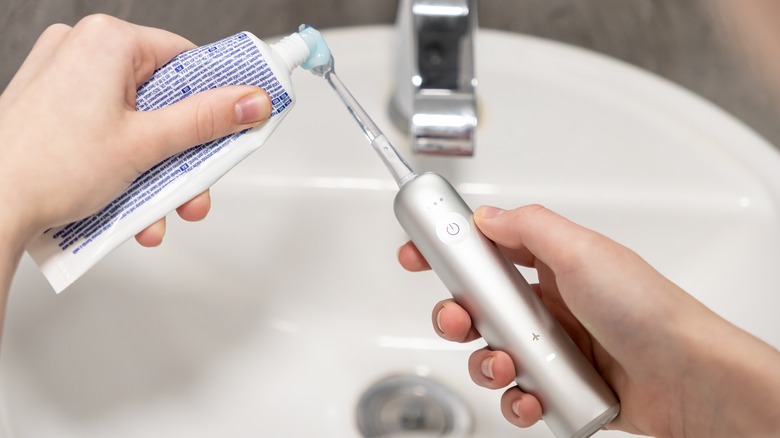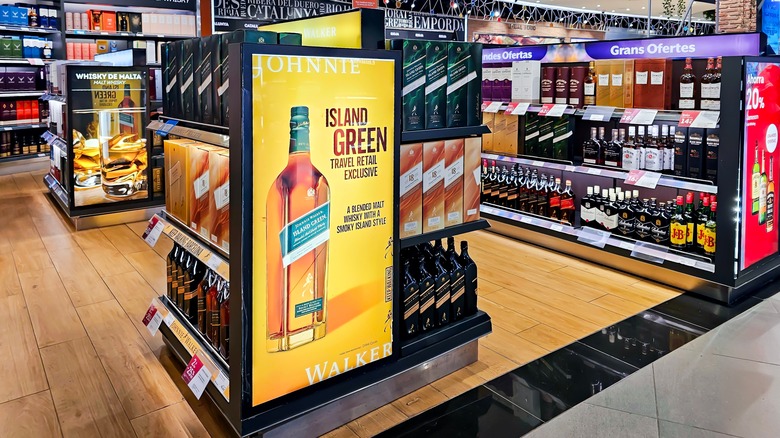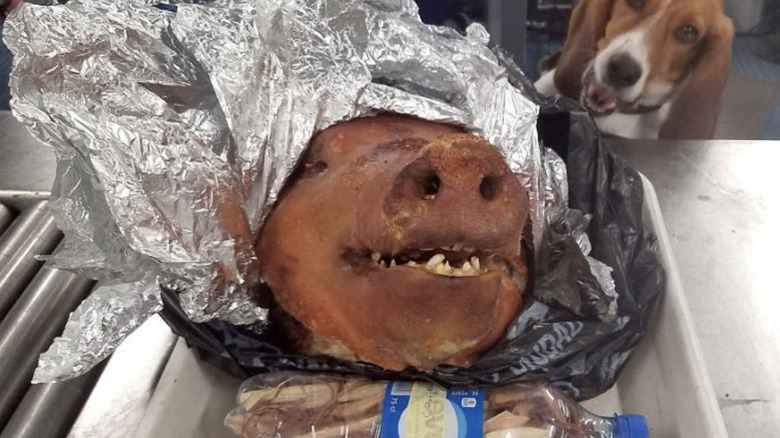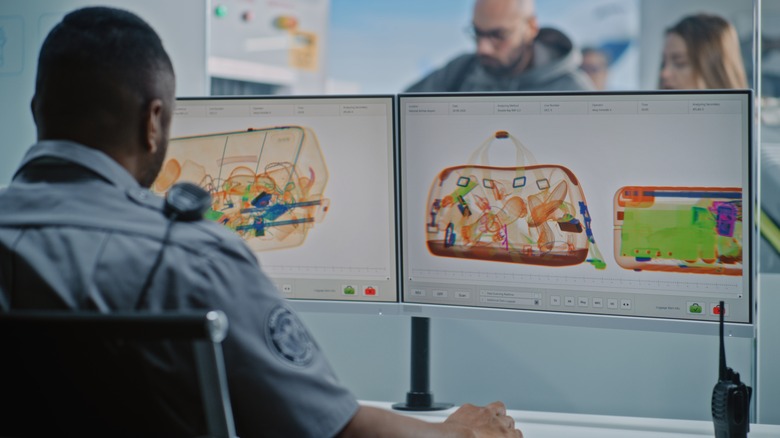10 Things Banned From Flights In 2025
Since the early days of commercial flight, when glamorous airlines like Pan Am dominated the skies, the air travel industry has been evolving, and so have the rules that govern what passengers can and cannot bring when they board. Every year, airlines and national security administrations worldwide reassess their policies, often in response to emerging safety concerns, new technologies, or global events. These changes may seem small — like changing what foods the TSA will allow through security or altering allowable amounts of liquids — but they can make the difference between breezing through the line or dealing with confiscations before you even get your post-security Starbucks.
The year 2025 has been no exception when it comes to changes in air travel policy. From hair styling tool restrictions to banned fruit, this year's flight rule shifts might catch even seasoned travelers by surprise without proper preparation. Additionally, enforcement often varies by region, meaning something you can easily travel with at home might not be allowed in another part of the world. The purpose of this guide is simple: We want you to stay one step ahead before your next flight. Whether you're packing for a weekend getaway later in 2025 or looking ahead to a big international holiday in 2026, knowing the latest airline baggage updates will make your next trip smoother, no matter where you're headed.
CBD gummies and hemp-derived products over certain THC limits
If you're a user of THC or hemp-derived products, lean in, as this rule applies to gummies, oils, creams, tinctures, or anything else that purports to contain cannabinoids like THC. Under federal law, products classified as "hemp" are legal only if they contain no more than 0.3% Delta-9 THC on a dry weight basis. Anything beyond that is technically considered marijuana, which remains illegal under federal law. The TSA heavily reiterated the importance of this rule this year. If you're bringing along CBD gummies, hemp balm, or any similar products, the item(s) must be compliant with TSA regulations, or you risk confiscation.
Your products should be clearly labeled as hemp-derived, with lab testing or a Certificate of Analysis (COA) confirming the amount of THC is under the 0.3% threshold. Even if you're following these rules, enforcement can vary. TSA officers will not flag your bag without cause. However, if a product appears to exceed federal limits or has an extremely strong smell, it may be pulled for additional screening. Also, your destination matters. Within the United States, certain state laws may be stricter, and international destinations have widely varying THC and marijuana regulations. Brittney Griner's arrest and subsequent incarceration for possession of cannabis oil cartridges in Russia is a prime example of how an inadvertent packing mistake can go horribly wrong.
Cordless hair tools with gas/butane in checked bags
In addition to a new list of banned items in June 2025, the TSA implemented a new restriction in August 2025 that many travelers might still be unaware of. Cordless hair tools powered by gas or butane cartridges (including butane curling irons and flat irons) are no longer permitted in checked luggage. This policy shift comes amid concerns that these devices could spark fires in the cargo holds of planes. It is important to note that cordless hair tools can still be packed in carry-on baggage, but with important caveats: Each device must have a safety cover over its heating element and be protected from accidental activation.
Although cordless hair styling tools are convenient for on-the-go use, the easiest way to avoid problems at airport security is to pack traditional, corded hair styling tools. Curling irons, straighteners, and other products that plug into outlets and do not have a gas or butane power source are still allowed in both checked and carry-on suitcases. As the Los Angeles Times noted, "replacing the cord with a battery for power is what's keeping the devices out of the cargo section of the plane." If you plan to travel with a cordless hair styling tool in the near future, double-check the type of power source and make sure it has a safety cover. Leaving it behind or packing it properly will help you avoid having it confiscated at baggage drop-off.
Cordless hair tools and power tools with lithium batteries in checked bags
When the TSA issued its new guidance regarding gas and butane-powered hair tools, it also clarified that cordless hair tools powered by lithium-ion or lithium-metal batteries are not permitted in checked bags. Again, the reasoning here comes down to fire safety. If a lithium battery overheats or malfunctions in the cargo hold, a blaze could break out with no way for the cabin crew to intervene. As one TSA spokesperson explained to LAist, "Checked baggage goes to the belly of the aircraft, [which] is out of reach and cannot be monitored by passengers and crew."
Like their butane and gas-powered counterparts, cordless hair styling devices with lithium-ion batteries must have a safety cover fitted securely over the heating element, and they must be protected against accidental activation if you wish to pack them in your carry-on baggage. The TSA's "Power Tools" rule page clarifies that the same lithium-battery safety concerns apply to other battery-powered power tools. As with any items, TSA agents may perform additional inspection if these lithium-ion-powered items are found during the security screening process. To reiterate, the simplest way to avoid confiscation is to pack corded curling irons, straighteners, drills, or whatever else you may need to take to your destination.
Spare butane cartridge refills
Although butane-powered cordless hair tools are allowed in carry-on baggage (with the aforementioned safety cover and protection from accidental activation), small gas or butane refill cartridges are now entirely banned from both checked and carry-on luggage under TSA's 2025 rules. These cartridges are classified under "Butane" in TSA's flammables list, with a clear "No" for both carry-on and checked bags. The official page emphatically states, "Carry On Bags: No — Checked Bags: No."
The TSA views the fuel source (gas/butane) of these cordless items as an independent safety risk, even when the tool itself is compliant with regulations. This ban is not just about hair tools themselves, but about what powers them. If there's any doubt in your mind about compliance, leave the cartridges behind. The main implication here is that if you decide to safely pack a cordless, butane-powered hair styling device in your carry-on bag, you can't take any spare cartridges to use once you arrive at your destination. This means you must either rely on a single cartridge for your entire trip or plan to purchase refills locally, which may not always be easy or even possible depending on your destination. International locales, for example, are sometimes quite strict about the transit of combustible fuels.
Southwest Airlines' wheelchair and scooter battery rules
Beginning September 25, 2025, Southwest Airlines has implemented tougher rules for passengers who use lithium-powered wheelchairs or scooters. Under the brand's new policy, travelers must remove the removable lithium battery from their mobility device and bring it into the cabin themselves. The battery won't count toward their carry-on or personal item allowance. Again, this move is intended to reduce fire risks in aircraft cargo holds. Moving ahead, mobility devices with batteries exceeding 300 watt-hours will no longer be accepted whatsoever by Southwest after a grace period that ends January 11, 2026.
Southwest also introduced a May 2025 policy related to portable chargers and battery packs. These devices must be visible to the cabin crew while in use during flights, rather than stowed away in bags or overhead bins. Dave Hunt, Southwest's vice president of safety and security, said (as reported by Fox 5 San Diego), "Lithium batteries have become one of the most common sources of smoke and fire incidents on aircraft. While these events are rare, quick access and visibility are critical to keeping everyone onboard safe." For travelers, Southwest's new bans may seem strict, but they are meant to prevent in-air disasters. On the bright side, the airline's Rapid Rewards members can enjoy free in-flight Wi-Fi starting October 24, 2025.
Power banks and in-flight charging restrictions
Like Southwest, multiple Asian airlines have also tightened rules on power bank usage during flights in 2025. While policies differ by carrier and route, new restrictions include banning in-flight charging altogether, restricting power bank placement, and limiting capacity. If you have upcoming travel plans in Asia, make sure you check the current rules for your airline. For example, beginning March 1, Taiwan's EVA Air banned in-flight charging. Per GateChecked, "the use and charging of power banks and spare lithium batteries will be prohibited throughout the flight ... please be reminded to fully charge them before boarding. Most airplane seats are equipped with AC power outlets and USB (Type A) ports." Thai Airlines implemented a similar ban starting March 15, 2025, while Singapore Airlines' ban began on April 10. Air Asia, China Airlines, and Uni Air have also all barred the use of portable chargers on flights.
Additionally, South Korea implemented nationwide airline restrictions in March. A statement by Yoo Kyung-so of South Korea's MOLIT (as reported by AeroTime) explained authorities' logic, "As the public is very anxious about bringing power banks on board, we plan to further strengthen passenger guidance and management procedures for power banks and e-cigarettes ..." South Korea now limits passengers to coming onboard with no more than five 100-watt-hour portable batteries. Battery packs over 160 watt-hours are banned altogether. Many of these new measures throughout Southeast Asia are the result of a January fire on an Air Busan aircraft, in which a power bank is the suspected catalyst for the blaze. If you have plans to travel in Asia in the near future, be hyper-vigilant about your battery pack usage, and remember that there are still plenty of things you can pack to make long-haul flights more bearable.
Durian is banned by some airlines and airports
While fresh fruit and vegetables can always cause problems at customs, one particular fruit is a menace in Southeast Asia. The notoriously pungent durian fruit has been the subject of specific travel policies in 2025. Due to its overpowering, sulphuric odor, many airlines and airports have begun explicitly banning durian from flights. Passengers report being forced to finish the fruit before boarding or surrender it at security checkpoints. In one recent incident, a Chinese family in Chiang Mai, Thailand, had purchased 12 pounds of fresh durian. Upon discovering it was not permitted on their outbound flight, they quickly consumed as much as they could while standing outside the airport.
Meanwhile, in Singapore, durian is formally prohibited on public transportation systems, including buses and MRT (Mass Rapid Transit) trains. Signs reading "No durians" are common on buses and in transit stations. The rules around durian are primarily driven by concern for other travelers. The fruit's unpleasant odor can linger, penetrate upholstery on buses, trains, and planes, and cause serious discomfort for those with sensitivity to strong smells. If you will soon be traveling within Southeast Asia, check both your airline and local transit policies before attempting to transit with any durian-based food products.
Buzzing battery devices can be confiscated
Another change made due to the risk of fire, the TSA issued a September 2025 update regarding how to pack "buzzing" battery-powered devices. Things that buzz — such as electric toothbrushes, electric razors, and similar battery-powered gadgets — must be packed in your carry-on bag if they have installed lithium batteries. This way, if a battery malfunctions mid-flight, it's within easy reach for immediate response. TSA clarified via a post on X, formerly known as Twitter, that reads, "Traveling with your electric toothbrush, or other items that buzz? If they have an installed lithium battery you should pack them in your carry-on bag." When packing, think ahead. Keep buzzing devices accessible, protect the batteries, and always check what kind of battery your items use. It could save you serious frustration (or even confiscation) at the airport.
As always, there are potential international hiccups to consider. One recent Reddit post inquired, "I am travelling from Dublin to Toronto and I have my IPL laser machine, an electric cordless shaver and electric toothbrush. Where do I pack these? Of course I dont want to throw them at airport security." A kind fellow traveler reminded them to consider the electrical outlets in other nations, "Shaver and toothbrush typically have Li-ion batteries in them so they'd need to be in your carry-on or personal item. If the IPL is corded like most then you can pack them in your checked bag. Check to see if it'll even work with the voltage difference in Toronto."
Certain duty-free alcohol purchases
In 2025, alcohol rules on European budget airlines like Ryanair became even stricter. Ryanair's official policy now states that any duty-free alcohol over 70% ABV (140 proof) is outright banned. This means that ultra-high-proof spirits, such as Everclear and some rums, cannot be carried on board at all. Other alcohol can still be purchased duty-free, either at the airport or on the plane, but Ryanair specifically notes that passengers are not allowed to consume their own alcohol while on board. In-flight consumption is limited to beverages served by the cabin crew. This allows staff to monitor passengers' alcohol consumption in order to minimize the risk of disruptive behavior. Fellow European brand EasyJet has a similar policy that states, "Alcohol must be lower than 70% ABV, and packed either in an airport shopping bag or in your cabin bag. It's strictly forbidden to drink any alcohol that has not been purchased on board the aircraft and those found consuming their own alcohol may face prosecution."
Ryanair — an airline that has also encouraged travelers to avoid black, grey, or navy luggage — is also pushing for additional bans in 2025. The airline has called for stricter limits on alcohol sales in airports, such as restricting bar service to two drinks per passenger and requiring boarding passes to track alcohol purchases. These proposals come after the airline dealt with a particularly unruly passenger on a flight from Dublin to Lanzarote, Spain, in 2024. Per a CNN report, "the airline said it had filed for €15,000 ($15,400) in damages from the passenger after it said their 'inexcusable behaviour forced this flight to divert to Porto where it was delayed overnight, causing 160 passengers to face unnecessary disruption.'"
Exotic foods and plants
In 2025, U.S. Customs and Border Protection (CBP) issued fresh warnings to international travelers about expanding enforcement of regulations regarding the transportation of food, plants, and animal products into the United States of America. Whether it's fresh produce, meat, seeds, soil, or animal byproducts, CBP notes that all agricultural items – including animal hides, carcasses, and dried foods – must be declared upon entry. In a particularly memorable anecdote shared on X in July 2025, a CBP detection dog uncovered a cooked pig's head wrapped in foil, among bottles filled with other animal byproducts, in a traveler's luggage. This image was shared as part of CBP's reminder about increased enforcement.
If you're like many travelers, you might be wondering why there are such strict rules surrounding agricultural transportation. In short, undeclared imports risk introducing pests, diseases like foot-and-mouth, or exotic pathogens that could harm livestock, plants, crops, and ecosystems in the U.S. Some helpful notes for travelers are to always check "yes" on the CBP declaration form if you have any food, fruit, plant, seeds, soil, or animal products, to properly pack and declare all items (don't assume processed or wrapped foods are okay by default), and to be aware that inspections might include canine units or manual checkpoints. Any undeclared items are at risk of seizure.
Methodology
To compile this guide, we used TSA and international regulatory websites, in addition to airline websites, major news outlets, and personal anecdotes from people who have traveled in 2025. Things in the aviation industry are changing fast, particularly in regard to battery-powered products and portable chargers, and it is important for travelers to be aware of these changes. The goal of this piece is to help readers fly smarter by avoiding unexpected security mishaps and confiscations based on new baggage policy changes in 2025.
